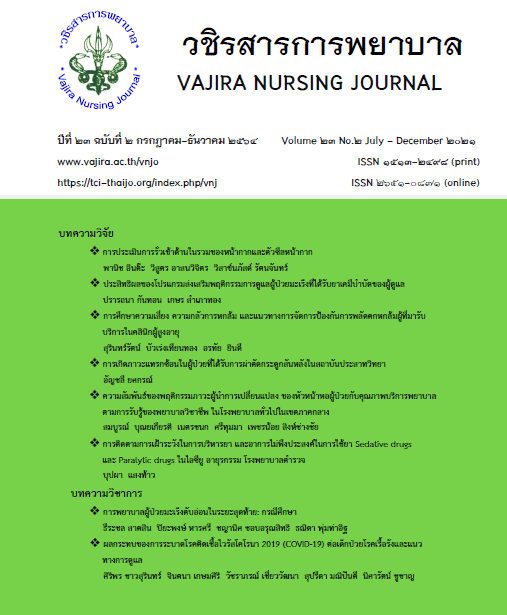ประสิทธิผลของโปรแกรมส่งเสริมพฤติกรรมการดูแลผู้ป่วยมะเร็งที่ได้รับยาเคมีบำบัดของผู้ดูแล
Main Article Content
บทคัดย่อ
การวิจัยกึ่งทดลอง เพื่อศึกษาผลของโปรแกรมส่งเสริมพฤติกรรมการดูแลผู้ป่วยมะเร็งที่ได้รับยาเคมีบำบัดของผู้ดูแล ที่ผู้วิจัยประยุกต์ใช้แนวคิดการรับรู้ความสามารถของตนเองร่วมกับการสนับสนุนทางสังคม ศึกษาในผู้ดูแลผู้ป่วยมะเร็งที่มารับบริการในหน่วยให้ยาเคมีบำบัด กลุ่มตัวอย่าง 42 ราย เป็นกลุ่มทดลอง 21 ราย กลุ่มเปรียบเทียบ 21 ราย เครื่องมือที่ใช้ได้แก่ โปรแกรมส่งเสริมพฤติกรรมการดูแลที่พัฒนาขึ้นกลุ่มเปรียบเทียบได้รับคำแนะนำตามปกติ รวบรวมข้อมูลโดยใช้แบบสอบถาม ผลการวิจัย กลุ่มทดลองมีค่าเฉลี่ยพฤติกรรมหลังได้รับโปรแกรม ที่ 2 สัปดาห์และ 4 สัปดาห์ มากกว่าก่อนการทดลอง (p< 0.001) เมื่อควบคุมปัจจัยคะแนนพฤติกรรมก่อนเข้าร่วมโปรแกรมด้วย อายุ เพศ และการศึกษา พบว่าที่ 2 สัปดาห์ กลุ่มทดลองมีค่าเฉลี่ยพฤติกรรมมากกว่ากลุ่มเปรียบเทียบ 15.67 คะแนน (95% CI 13.29-18.05, p<0.001) ที่ 4 สัปดาห์ พบว่ากลุ่มทดลองมีค่าเฉลี่ยพฤติกรรมมากกว่ากลุ่มเปรียบเทียบ 15.06 คะแนน (95%CI 12.98-17.14, p<0.001) เมื่อวิเคราะห์โดยรวมพบว่า กลุ่มทดลองมีคะแนนพฤติกรรมมากกว่ากลุ่มเปรียบเทียบ 15.37 คะแนน (95%CI 13.53-17.20, p<0.001) จากผลการวิจัย พบว่าโปรแกรมส่งเสริมพฤติกรรมการดูแลผู้ป่วยมะเร็งที่ได้รับยาเคมีบำบัดของผู้ดูแล ที่ประยุกต์มาจากแนวคิดการรับรู้ความสามารถของตนเองร่วมกับการสนับสนุนทางสังคม ส่งผลให้ผู้ดูแลผู้ป่วยมีพฤติกรรมการดูแลผู้ป่วยมะเร็งที่ได้รับยาเคมีบำบัดเพิ่มมากขึ้น ดังนั้นหน่วยให้ยาเคมีบำบัดควรนำโปรแกรมการส่งเสริมพฤติกรรมการดูแลผู้ป่วยมะเร็งไปปรับใช้ โดยเฉพาะในการมารับยาเคมีบำบัดครั้งแรกของผู้ป่วย
Article Details
เนื้อหาและข้อมูลในบทความที่ลงตีพิมพ์ในวชิรสารการพยาบาลถือเป็นข้อคิดเห็นและความรับผิดชอบของผู้เขียนบทความโดยตรง ซึ่งกองบรรณาธิการไม่จำเป็นต้องเห็นด้วย หรือร่วมรับผิดชอบใด ๆ ทั้งสิ้น
บทความ ข้อมูล เนื้อหา รูปภาพ ฯลฯ ที่ได้รับการตีพิมพ์ในวชิรสารการพยาบาล ถือเป็นลิขสิทธิ์ของวชิรสารการพยาบาล หากบุคคลใดหรือหน่วยงานใดต้องการนำทั้งหมดหรือส่วนหนึ่งส่วนใดไปเผยแพร่ต่อหรือเพื่อกระทำการใด ๆ จะต้องได้รับอนุญาตเป็นลายลักอักษรจากวชิรสารการพยาบาลก่อนเท่านั้น
เอกสารอ้างอิง
คณะแพทยศาสตร์โรงพยาบาลรามาธิบดี มหาวิทยาลัยมหิดล (2561 มิถุนายน 8 ). การดูแลผู้ป่วย“มะเร็งลำไส้ส่วนปลาย”หายได้จากคนใกล้ตัว : พบหมอรามาช่วง Rama Health Talk. [วีดีโอ]. เข้าถึงได้ จาก https://www.youtube.com/watch?v=n3eUNRWXYXA
เฉลิมศรี แนวจำปา, จงจิต เสน่หา, วิมลรัตน์ ภู่วราวุฒิพานิช, และนพดล โสภารัตนาไพศาล (2557). ประสบการณ์การมีอาการ กลวิธีการจัดการกับอาการ และภาวการณ์ทำหน้าที่ในผู้ป่วยมะเร็งเต้านม ระยะ IV ที่ได้รับเคมีบำบัด. วารสารสภาการพยาบาล, 29(1). 15-28
ชวิศา รัตนกมลกานต์, ศรีมนา นิยมค้า, และอุษณีย์ จินตะเวช. (2564). สมรรถนะแห่งตน การสนับสนุนทาง สังคม และภาระการดูแลของผู้ดูแลเด็กโรคมะเร็งที่ได้รับเคมีบำบัด. พยาบาลสาร. 48(2):232-245
ดวงพร ชาศรี, เรณู พุกบุญมี, และพิศมัย อรทัย. (2561). ผลของการเสริมสร้างการรับรู้สมรรถนะแห่ง ตนต่อความมั่นใจในการมีส่วนร่วมดูแลเด็กป่วยของผู้ดูแลก่อนย้ายจากหอผู้ป่วยวิกฤตเด็ก. วารสารพยาบาลทหารบก, 19(3), 234-242.
พิจิตรา เล็กดำรงกุล, คนึงนิจ พงศ์ถาวรกมล, ธนิษฐา ชมพูบุบผา, และนพดล ศิริธนารัตนกุล (2555). ความสัมพันธ์ระหว่างความต้องการข้อมูล ข้อมูลที่ได้รับ พฤติกรรมการดูแลตนเองและคุณภาพชีวิตในผู้ป่วยมะเร็งทางโลหิตวิทยาที่ได้รับยาเคมีบำบัด. วารสารพยาบาลศาสตร์, 30(3), 64-72.
ปาริฉัตร กุลษาบาล. (2550). ปัจจัยที่มีความสัมพันธ์กับการดูแลผู้ป่วยมะเร็งที่ได้รับยาเคมีบำบัด. (วิทยานิพนธ์ปริญญามหาบัณฑิต), มหาวิทยาลัยบูรพา, คณะพยาบาลศาสตร์.
วรรณิตา สอนกองแดง. (2558). ปัจจัยที่มีอิทธิพลต่อพฤติกรรมของผู้ดูแลในการดูแลเรื่องอาหารเพื่อป้องกันการติดเชื้อในเด็กป่วยมะเร็งเม็ดเลือดขาวที่มีภาวะเม็ดเลือดขาวต่ำจากเคมีบำบัด. (วิทยานิพนธ์ปริญญามหาบัณฑิต), มหาวิทยาลัยเชียงใหม่, คณะพยาบาลศาสตร์.
วารุณี มีเจริญ. (2557). ญาติผู้ดูแลผู้ป่วยมะเร็ง การปรับตัวต่อบทบาทและการส่งเสริมคุณภาพชีวิต.รามาธิบดีพยาบาลสาร, 20(1), 10-22.
อรุณ จิรวัฒน์กุล. (2558). สถิติทางวิทยาศาสตร์สุขภาพเพื่อการวิจัย (พิมพ์ครั้งที่ 4). กรุงเทพฯ: วิทยพัฒน์.
อรุณรัตน์ กาณจนะ. (2549). ผลของโปรแกรมการเสริมสร้างพลังจูงใจของมารดาต่อพฤติกรรมการดูแลบุตร โรคมะเร็งเม็ดเลือดขาวที่ได้รับยาเคมีบำบัด. (วิทยานิพนธ์ปริญญาดุษฏีบัณฑิต). มหาวิทยาลัยมหิดล, คณะพยาบาลศาสตร์.
Albreht, T., Moreno, M.-M., Jelenc, M., Gorgojo, L., & Harris, M. (2015). European guide for quality national cancer control programmes. Slovenia: National Institute of Public Health, Trubarjeva 2, 1000 Ljubljana
Bandura, A. (1997). Self-efficacy: The exercise of control. New York: W.H Freeman and company New York
Cancer care. (2018). Understanding and Managing Chemotherapy Side Effects. Retrieved from https://media.cancercare.org/publications/original/24-ccc_chemo_side_effects.pdf
Havyer, R. D., Ryn, V. M., Wilson, P. M., & Griffin, J. M. (2017). The effect of routine training on the self-efficacy of informal caregivers of colorectal cancer patients. Supportive Care in Cancer, 25(4), 1071-1077. doi:10.1007/s00520-016-3494-6
Hendrix, C. C., Landerman, R., & Abernethy, A. P. (2013). Effects of an individualized caregiver training intervention on self-efficacy of cancer caregivers. Western journal of nursing research, 35(5), 590-610. doi:10.1177/0193945911420742
House, J. S., (1987). Social support and social structure. Sociological Forum, 2(1), 135.
International Agency for Research on Cancer. (2018). Latest global cancer data Retrieved from https://www.who.int/cancer/PRGlobocanFinal.pdf
International Agency for Research on Cancer (2019). The Global Cancer Observatory Thailand-Fact-Sheets-2018. Retrieved from http://gco.iarc.fr/today/data/factsheets/populations/764-thailand-fact-sheets.pdf.
Lee, Y. H., Liao, Y. C., Shun, S. C., Lin, K. C., Liao, W. Y., Chang, P. H., . . . Lai, Y. H. (2018). Trajectories of caregiver burden and related factors in family caregivers of patients with lung cancer. Psychooncology, 27(6), 1493-1500. doi:10.1002/pon.4678
The American Cancer Society. (2019). Caregiver Resource Guide. Retrieved from https://www.cancer.org/treatment/caregivers/caregiver-resource-guide.html


